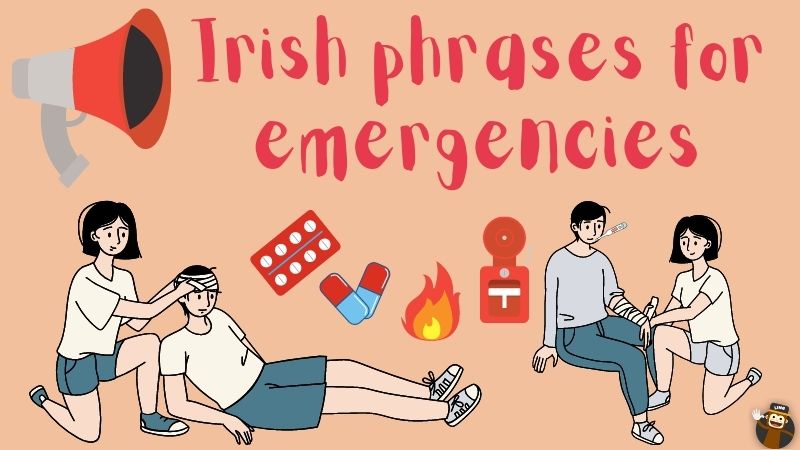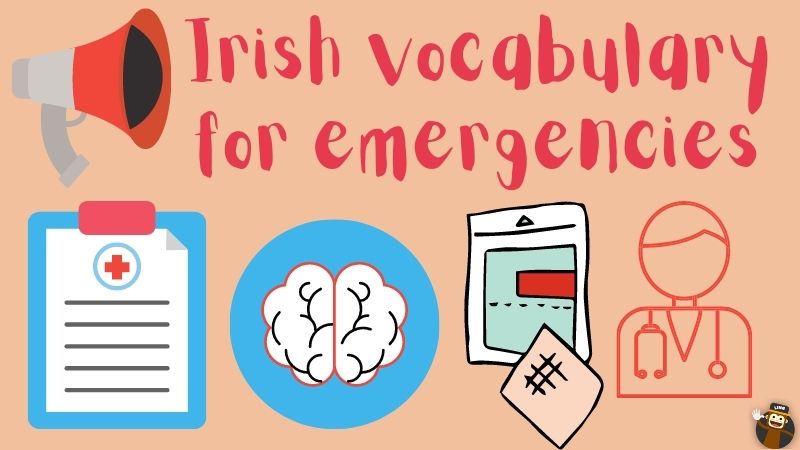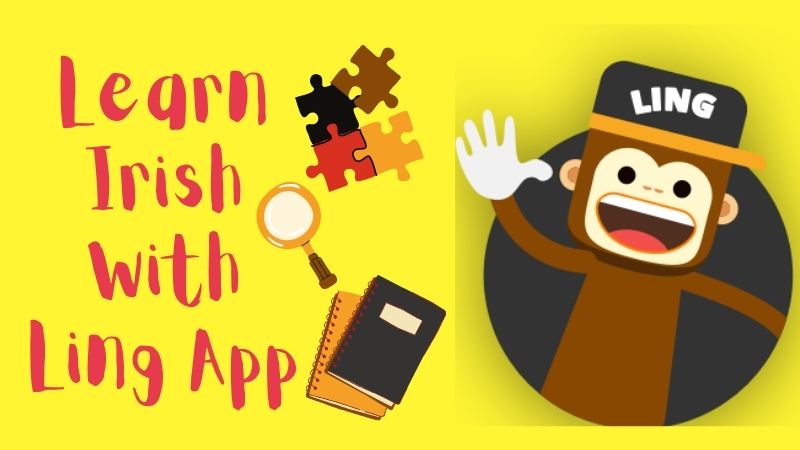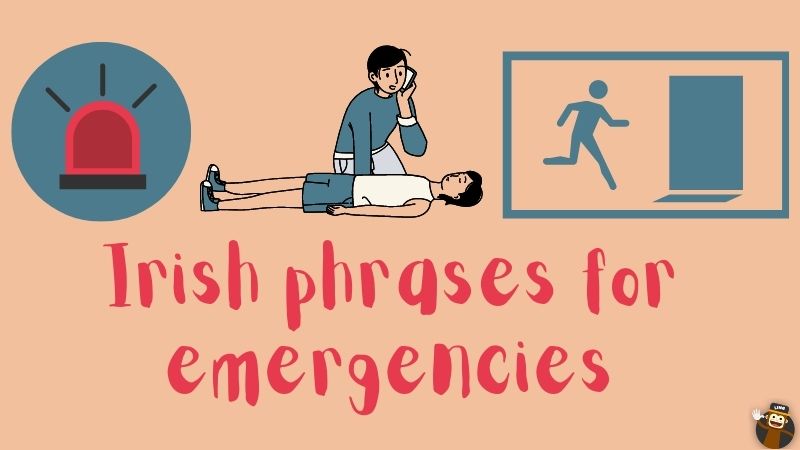Are you interested in learning about the Irish phrases for emergencies? In this blog post, we will walk you through all the important ones to expand your knowledge and help you learn more and more every day! Let’s start with a fun fact to feed your mind!
Did You Know?
The Irish language is one of the most beautiful languages in the world. People who live in Ireland speak this language. The Irish alphabet and letters are similar to English in writing but the pronunciation is way different from English.
Originally, Irish people lived on an island and used to speak only Irish. After some interactions with people from Galway and Australia, who used to visit there at the time or so, Irish people became familiar with English and English people got to know about Irish. English has become the first language of most of the people of Ireland but Irish is still spoken as the first language in some areas of the country like Waterford, Ulster, Mayo, Kerry, etc.
Irish phrases for emergencies

Here we are going to discuss the Irish language and its phrases. Different phrases are spoken in different situations. Following are certain English phrases with Irish translation and pronunciation used in an emergency as we need to address them.
I need a doctor
Ta orm dochuir a fheiceail is an Irish phrase used in an emergency. It means in English . Irish pronunciation for this phrase goes like taw vum doch-ture ah eckawl. For instance, if you get shot or wounded in case of a disaster, you can say that.
This phrase is very important to be learned for the people who are non- Irish and live in Ireland and also for the people who want to go there. For example, if you are stuck in any situation where you urgently need a doctor, this phrase would be a blessing in disguise.
I am ill!
This is the send English emergency phrase. Its Irish translation would be Ta me tinn. It is pronounced as Tay May teen in Ireland. Consider yourself in a situation where you visit your Irish friend and you are staying at his place.
And all of a sudden you fall ill. Unfortunately, your friend is not at home and you need a doctor immediately. What would you do? If you try to knock neighbor’s house you need this phrase to tell them that you are ill so that they can take you to the hospital. Always remember your health is the most important asset that you have so don’t be shy to tell someone that.
Call the police
It is an English phrase with an Irish translation as Cuir fios ar na Gardai, generally pronounced as kur fiss er un geode. Consider an example of you and your family going on a trip to Ireland. You and your family are in a park talking to each other. Suddenly you see some gangsters dragging some kids down the ground.
You need to call the police, but you are not native so, you don’t know the rules there. You would ask some random people in the park to call the police using this phrase. So that the kids are rescued and gangsters arrested. You can also do that if you see that someone has forgotten their address.
There is a fire
This is an English phrase meaning Ta tine ann in Irish. It is pronounced as Taw tinna unn. This phrase is also an important one to be known to foreigners. So that when you hear it, you can escape from that place. You can manage to get out only when you are aware of this phrase already.
Help
Help is translated as cabhru in the Irish language. Cabhru is a noun and cabhair is its associated word that means aid and assistance. So if you are in Ireland and you hear this word, this is alarming that somebody needs your help.
How are you?
Conas atá tú means how are you and is a phrase that you can ask someone when you see them looking a bit low. This is a great way of asking someone if they are doing good or not. The upside of learning this phrase is that you can easily use it in your everyday life as well, even if you do not encounter any unfortunate situations.
Following are some more basic phrases for emergency situations
- Conas ata tu: This is an Irish Gaelic/ Gaeilge meaning “go to your bed” in English.
- Cad is ainm duit: This is a very important phrase that you should surely know. It means “what is your name”. If you meet an Irish person, make sure you use this phrase to know his name.
- Gcás éigeandála: This is the Irish word used for emergency cases. An example sentence would make it more clear. If there is an emergency case in an area. You would use these words gcas eigeandala to indicate an emergency.
Other Useful Phrases
Here are some more Irish phrases for you to know about!
| Irish Phrases | English Translation |
| An bhfuil a fhios ag aon duine conas CPR a dhéanamh? | Does anyone know how to do CPR? |
| An bhfuil gach duine ceart go leor? | Is everyone okay? |
| An bhfuil tú ceart go leor? | Are you alright? |
| An féidir le haon duine cabhrú! | Can anyone help! |
| An féidir leat boladh dóite? | Can you smell burnt? |
| Ba mhaith liom goid a thuairisciú. | I want to report theft. |
| Beidh sé ceart go leor! | It will be ok! |
| Bhí buirgléireacht ann. | There was a burglary. |
| Bí cúramach! | Be careful! |
| Bi curamach! | Be careful! |
| Cabhair liom le do thoil! | Please help me! |
| Cabhair liom! Tá mé anseo. | Help me! I am here. |
| Cabhrú le duine éigin! | Help someone! |
| Cabhrú! | Help! |
| Cásanna deacra eile | Other difficult situations |
| Cuir glaoch ar na póilíní! | Call the police! |
| Cuir glaoch ar otharcharr. | Call an ambulance. |
| Cuir glaoch ar otharcharr/aimsigh/aimsigh na póilíní/briogáid dóiteáin! | Call an ambulance / find / find the police / fire brigade! |
| Déan deifir le do thoil! | Please hurry up! |
| Déan deifir! | Hurry! |
| Dóiteáin! | Fire! |
| Éigeandálaí leighis | Medical emergencies |
| Fág mise, le do thoil! | Leave me alone, please! |
| Féach amach! | Look out! |
| Ghearr/dhó mé mé féin. | I cut / burned myself. |
| Goid a tharla. | Theft has occurred. |
| Goideadh mo ghuthán. | My phone was stolen. |
| Goideadh mo ríomhaire glúine. | My laptop was stolen. |
| Goideadh mo sparán mála láimhe. | My handbag wallet was stolen. |
| Goideadh mo sparán mála láimhe. | My handbag wallet was stolen. |
| Goideadh rud éigin. | Something was stolen. |
| Gortaíodh / gortaíodh mé. | I was hurt / injured. |
| Gread leat! | Gread you! |
| Ná bí buartha. | Do not be worried. |
| Ní féidir liom análú. | I can’t breathe. |
| Ní féidir liom mo chuid eochracha a aimsiú. | I can’t find my keys. |
| Ní ghortóidh sé. | It will not hurt. |
| Níl a fhios againn cá bhfuil muid. | We do not know where we are. |
| Níl sé ag análú. | He is not breathing. |
| Rabhadh contúirte do dhuine | Danger warning for someone |
| Rinne mé dearmad ar ainm mo óstán. | I forgot the name of my hotel. |
| Rinneamar dearmad cá bhfuil muid ag fanacht. | We forgot where we were staying. |
| Stop, a thief! | Stop, a thief! |
| Tá an foirgneamh trí thine! | The building is on fire! |
| Tá deacracht agam anáil. | I have trouble breathing. |
| Tá dochtúir ag teastáil uaim. | I need a doctor. |
| Tá ionsaí déanta orm. | I have been attacked. |
| Tá lámh seasta agam. | I have a steady hand. |
| Tá mé ag tachtadh. | I’m choking. |
| Tá mé buailte | I’m beaten |
| Tá mé faoi ghlas istigh. | I’m locked inside. |
| Tá mé lámhaigh! | I’m shot! |
| Tá mé mugged. | I’m mugged. |
| Tá mé traochta. | I am exhausted. |
| Tá mo charr briste isteach. | My car is broken into. |
| Tá mo shúile ar lasadh. | My eyes are on. |
| Tá mo sparán caillte agam. | I have lost my wallet. |
| Tá mo theach briste isteach. | My house is broken into. |
| Tá m’árasán briste. | My apartment is broken. |
| Tá ocras an domhain orm. | I am very hungry. |
| Tá tine ann! | There’s a fire! |
| Táim caillte. | I’m lost. |
| Táimid caillte. | We are lost. |
| Tharla timpiste! | An accident has occurred! |
| Tharla timpiste. | An accident occurred. |
| Tóg go bog é! | Take it easy! |
| Tóg go bog é! | Take it easy! |
Basic Vocabulary

Let’s also learn some important words to use in Irish in case of some emergencies:
| Irish Words | Words in English |
| Adrenaline | Adrenaline |
| Aerbhealach | Airway |
| Ag lagú | Weakening |
| Ag tachtadh | Choking |
| Aicéatimín | Acetaminophen |
| Ainéistéiseach | Anesthetic |
| aingíne | angina |
| Anaifiolacsas | Anaphylaxis |
| Análú | Breathing |
| Antaibheathaigh | Antibiotics |
| Avulsion | Avulsion |
| Briseadh | Break |
| Brú fola | Blood pressure |
| Bruise | Bruise |
| Buinneach | Diarrhea |
| Cairdiach | Cardiac |
| Calaimín | Calamin |
| Cardipulmonary | Cardipulmonary |
| Ceann solais | Light head |
| Cód Éigeandála | Emergency Code |
| Cógaisíocht | Pharmacy |
| Comhbhrú | Compression |
| Concussion | Concussion |
| Contusion | Contusion |
| Créachta | Wounds |
| Cúram Príomhúil | Primary Care |
| C-Spine | C-Spine |
| Decongestant | Decongestant |
| Diaibéiteas | Diabetes |
| Dífhibrileoir | Defibrillator |
| Díobháil | Injury |
| Dislocation | Dislocation |
| Dóigh | Burn |
| Éidéime | Edema |
| Éigeandála | Emergency |
| Eirgeanamaíocht | Ergonomics |
| Entonox | Entonox |
| Eorradh | Eorradh |
| Glúcós | Glucose |
| Imbhualadh | Collision |
| Inslin | Insulin |
| Iobúpróifein | Iobuprofen |
| Laceration | Laceration |
| Mála aeir | Airbag |
| Mini stróc | Mini stroke |
| Nausea | Nausea |
| nimhneach | hurts |
| Ocsaigin Éigeandála | Emergency Oxygen |
| Oideas | Recipe |
| Ointment | Ointment |
| Pian cliabh | Chest pain |
| Pulse | Pulse |
| Puncture | Puncture |
| Roinn Éigeandála | Emergency Department |
| Salbutamol | Salbutamol |
| Staid Aisghabhála | State of Recovery |
| Stróc | Stroke |
| Suirbhé Bunscoile | Primary Survey |
| Suirbhé Tánaisteach | Secondary Survey |
| Taom croí | Heart attack |
| Urlacan | Urlacan |
| Vertigo | Vertigo |
| X-gha | X-ray |
Wrapping Up

Some people have an art to learning languages and they just learn them in a week or so, but most people have to work hard to learn new languages and use different ways to do so. Some people install apps while others take information from different websites. Some people learn languages by reading while others take some courses in language learning. Others also use news or TV platforms for this purpose.
Learning a new language is an ability that is found in some people while others can also learn by the read-write system along with examples.
Ling App brings a perfect solution for all such people. It is as beneficial for a person who likes learning from a tutor as much as it is for a person who prefers to read a blog post. It is not that tough task to attain. You just need to excuse your other engagements of the day for some time and you would surely learn them. We also have other blog posts for you to check out: Telling Time In Irish and The Clothes In Irish.
Happy learning!


















